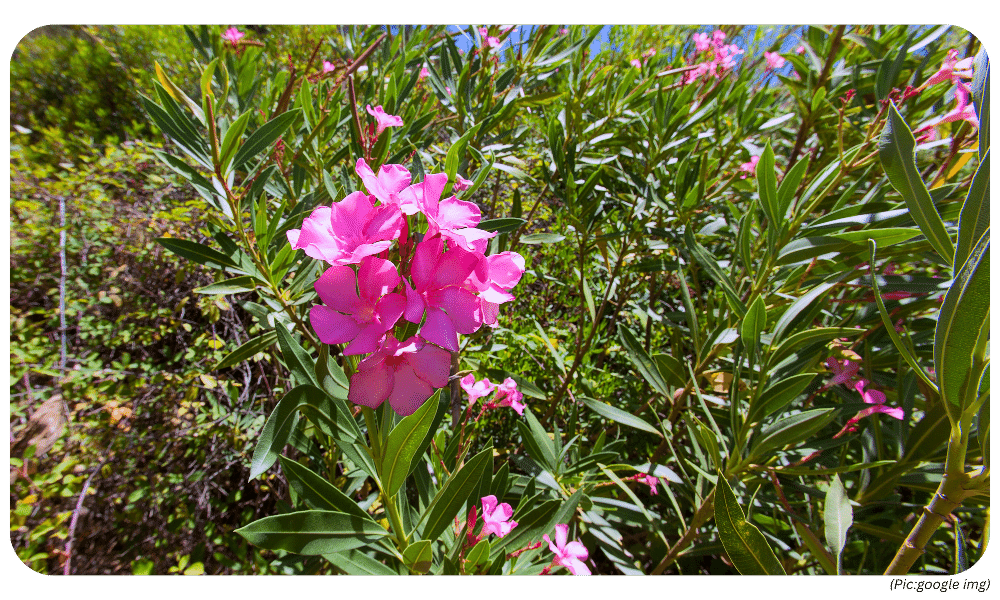Summary:
-
- Ban by Temple Boards: The Travancore and Cochin Devaswom Boards in Kerala have banned oleander flowers in temple offerings.
-
- Reason for Ban: A 24-year-old woman died after ingesting toxic oleander leaves, prompting the ban.
-
- Public Safety: The decision reflects the boards’ commitment to ensuring devotees’ safety by preventing health hazards.
-
- Economic Impact: The ban affects local communities that grow and supply oleander flowers, requiring a shift to alternative crops.
-
- Health Awareness: The ban highlights the need for public awareness about the toxicity of certain plants and the importance of safety in traditional practices.
What is the news?
-
- In Kerala, two major temple boards that collectively manage around 2,500 temples have banned the use of oleander flowers in temple offerings. This decision follows the unfortunate death of a 24-year-old woman who accidentally ingested oleander leaves.
Background
Temple Boards in Kerala
-
- Travancore Devaswom Board (TDB): One of the major temple management authorities in Kerala.
- Cochin Devaswom Board (CDB): Another significant body overseeing temple administration in the state.
These boards are responsible for the management and administration of thousands of temples, ensuring religious practices are conducted smoothly and safely.
About Oleander Plant (Arali):
Scientific Name: Nerium oleander
-
- Characteristics: Oleander is a popular ornamental plant known for its beautiful and fragrant flowers, but all parts of the plant are toxic if ingested.
- Usage in Temples: Traditionally, oleander flowers are used in temple rituals and offerings due to their vibrant color and availability.
Incident Leading to the Ban
-
- Accident: A 24-year-old woman died after chewing oleander leaves, mistaking them for edible leaves.
- Toxicity: Oleander contains potent toxins such as oleandrin and nerine, which can cause severe symptoms and are potentially fatal if ingested.
The primary toxin is oleandrin, but other cardiac glycosides include nerin, digitoxigenin, and olinerin. The bark of the oleander also contains rosagenin, which has strychnine-like effects.
Implications of the Ban
- Safety Measures
-
- Public Health: The ban is primarily a public health measure to prevent similar incidents in the future. It reflects the boards’ responsibility to ensure the safety of devotees.
- Awareness: The incident highlights the need for increased public awareness about the toxic nature of certain plants commonly used in religious and cultural practices.
Religious Practices
-
- Ritual Adaptation: Temples will need to adapt their rituals and offerings to exclude oleander flowers. This may involve finding alternative flowers or offerings that are safe and acceptable within the religious context.
- Community Impact: The ban may affect local communities involved in the cultivation and supply of oleander flowers to temples, necessitating a shift to other crops or flowers.
Significance from a UPSC Perspective
Governance and Public Administration
-
- Decision-Making: This incident showcases the role of government bodies in making swift decisions to ensure public safety.
- Regulation: It emphasizes the importance of regulatory oversight in religious and cultural practices to prevent health hazards.
Social Issues
-
- Public Health Awareness: The need for continuous public health education to prevent accidental poisonings.
- Cultural Sensitivity: Balancing traditional practices with modern safety standards.
Environmental Studies
-
- Plant Toxicity: Understanding the toxic properties of plants like oleander and their implications for human health.
- Botanical Knowledge: Encouraging the study of local flora and educating the public on safe and unsafe plants.
Conclusion
-
- The ban on oleander flowers in Kerala temples by the Travancore and Cochin Devaswom Boards is a significant step towards ensuring public safety. It reflects the boards’ proactive approach in preventing potential health risks associated with traditional practices. This decision underscores the importance of governance, public health awareness, and cultural sensitivity in contemporary society.
QuizTime:
Mains Questions:

Question 1:
Discuss the role of temple boards in ensuring public safety in the context of the recent ban on oleander flowers in Kerala temples. How does this decision reflect on the governance and administrative capabilities of these boards? (250 Words)
Model Answer:
The recent decision by the Travancore Devaswom Board (TDB) and Cochin Devaswom Board (CDB) to ban the use of oleander flowers in temple offerings underscores the critical role temple boards play in ensuring public safety. These boards are responsible for managing numerous temples and are tasked with the dual role of maintaining religious sanctity and ensuring the safety and well-being of devotees.
-
- Public Health and Safety: The decision to ban oleander flowers came after the tragic death of a young woman who accidentally ingested oleander leaves. Recognizing the toxic nature of the plant, the temple boards took swift action to prevent further incidents, highlighting their commitment to public health.
- Proactive Measures: The boards’ proactive approach in implementing the ban reflects their ability to respond quickly to potential hazards. This action demonstrates their foresight in identifying risks associated with traditional practices and their willingness to adapt to ensure safety.
- Regulatory Oversight: The boards’ decision also exemplifies their regulatory oversight in temple management. By enforcing such bans, they ensure that temple practices do not pose health risks, thus upholding their responsibility towards devotees.
- Administrative Efficiency: The effectiveness with which the ban was communicated and enforced across a large number of temples indicates strong administrative capabilities. The boards managed to coordinate with various stakeholders, including temple authorities and local communities, to implement the ban efficiently.
- Balancing Tradition and Safety: This decision highlights the challenge of balancing traditional practices with modern safety standards. While the use of oleander flowers has been a long-standing tradition, the boards showed adaptability in prioritizing human health over tradition.
In conclusion, the ban on oleander flowers by the Kerala temple boards is a testament to their governance and administrative strengths. It reflects their responsibility towards public safety, their proactive and regulatory role, and their ability to manage and implement necessary changes efficiently. This incident serves as a model for other religious and cultural institutions to follow, ensuring that traditional practices do not compromise the safety and well-being of individuals.
Question 2:
Analyze the social and economic impacts of banning oleander flowers in temple offerings on the local communities in Kerala. What measures can be taken to mitigate these impacts?(250 Words)
Model Answer:
The ban on oleander flowers in temple offerings by the Travancore Devaswom Board (TDB) and Cochin Devaswom Board (CDB) has significant social and economic impacts on local communities in Kerala, particularly those involved in the cultivation and supply of these flowers.
Economic Impact:
-
- Loss of Income: Communities that rely on growing and selling oleander flowers face a direct loss of income. Farmers, flower vendors, and those involved in the supply chain may suffer financial setbacks.
- Shift in Agricultural Practices: The ban necessitates a shift to other crops or flowers, which may involve initial costs and adjustment periods. Farmers may need training and support to cultivate alternative plants that are safe for temple offerings.
Social Impact:
-
- Cultural Adjustments: The ban might affect local cultural practices and traditions associated with the use of oleander flowers in religious rituals. Communities may need to find culturally acceptable substitutes, which could take time and effort.
- Health Awareness: The incident leading to the ban raises awareness about the toxic nature of certain plants. This increased awareness can lead to better public health practices, reducing the risk of similar incidents in the future.
Mitigation Measures:
-
- Financial Support and Compensation: The government and temple boards can provide financial assistance to affected farmers and vendors. Compensation for the loss of income and subsidies for transitioning to new crops can help mitigate economic impacts.
- Training and Resources: Offering training programs and resources for cultivating alternative flowers or crops can help farmers make a smoother transition. Agricultural extension services can play a vital role in this regard.
- Awareness Campaigns: Conducting public health awareness campaigns to educate people about the toxic nature of oleander and other hazardous plants can prevent future incidents. Informational workshops and educational materials can be distributed widely.
- Alternative Livelihood Programs: Introducing alternative livelihood programs for those heavily reliant on oleander cultivation can diversify income sources and reduce dependency on a single crop. This can include promoting handicrafts, small-scale industries, or other agricultural products.
In conclusion, while the ban on oleander flowers in temple offerings has immediate social and economic repercussions for local communities, targeted measures can mitigate these impacts. Financial support, training, awareness campaigns, and alternative livelihood programs are essential steps to ensure that the affected communities can adapt and thrive despite the changes. This approach not only addresses the immediate consequences but also fosters long-term resilience and sustainability.
Remember: These are just sample answers. It’s important to further research and refine your responses based on your own understanding and perspective. Read entire UPSC Current Affairs.
Relevance to the UPSC Prelims and Mains syllabus under the following topics:

Prelims:
-
- Current Events of National and International Importance: This topic is directly related to current events and highlights recent decisions made by governmental bodies, which is a crucial part of the UPSC Prelims syllabus.
- General Issues on Environmental Ecology, Biodiversity, and Climate Change: Understanding the toxic nature of certain plants and their impact on public health falls under environmental awareness and ecology.
Mains:
-
- General Studies Paper II:Governance, Constitution, Polity, Social Justice and International relations:
Governance: The role of temple boards in ensuring public safety and managing religious practices comes under the purview of governance. It demonstrates how administrative bodies function and respond to public health concerns.
Social Justice: The decision impacts local communities economically and socially, touching upon issues of social justice and the welfare of marginalized groups dependent on temple-related activities for their livelihood. - General Studies Paper III:Economic Development, Agriculture, and Environmental Issues:
Economic Development: The economic impact on local communities dependent on oleander flower cultivation and the measures needed to support them is relevant to this section.
Agriculture: The shift from oleander cultivation to alternative crops involves agricultural practices and policies.
Environment and Biodiversity: The toxicity of oleander plants and its implications for public health are related to environmental issues. - General Studies Paper IV:Ethics, Integrity, and Aptitude:
Public/Civil Service Values and Ethics in Public Administration: The decision by the temple boards to ban oleander flowers highlights the ethical responsibility of public administrators to ensure public safety, even when it involves altering long-standing cultural practices.
- General Studies Paper II:Governance, Constitution, Polity, Social Justice and International relations:











0 Comments